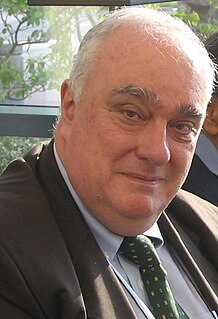Related Research Articles

Nuclear disarmament is the act of reducing or eliminating nuclear weapons. It can also be the end state of a nuclear-weapons-free world, in which nuclear weapons are completely eliminated. The term denuclearization is also used to describe the process leading to complete nuclear disarmament.
Arms control is a term for international restrictions upon the development, production, stockpiling, proliferation and usage of small arms, conventional weapons, and weapons of mass destruction. Arms control is typically exercised through the use of diplomacy which seeks to impose such limitations upon consenting participants through international treaties and agreements, although it may also comprise efforts by a nation or group of nations to enforce limitations upon a non-consenting country.

The Bulletin of the Atomic Scientists is a nonprofit organization concerning science and global security issues resulting from accelerating technological advances that have negative consequences for humanity. The Bulletin publishes content at both a free-access website and a bi-monthly, nontechnical academic journal. The organization has been publishing continuously since 1945, when it was founded by former Manhattan Project scientists as the Bulletin of the Atomic Scientists of Chicago immediately following the atomic bombings of Hiroshima and Nagasaki. The organization is also the keeper of the internationally recognized Doomsday Clock, the time of which is announced each January.

International Physicians for the Prevention of Nuclear War (IPPNW) is a non-partisan federation of national medical groups in 63 countries, representing doctors, medical students, other health workers, and concerned people who share the common goal of creating a more peaceful and secure world free from the threat of nuclear annihilation. The organization's headquarters is in Malden, Massachusetts. IPPNW was awarded the Nobel Peace Prize in 1985.

The Pugwash Conferences on Science and World Affairs is an international organization that brings together scholars and public figures to work toward reducing the danger of armed conflict and to seek solutions to global security threats. It was founded in 1957 by Joseph Rotblat and Bertrand Russell in Pugwash, Nova Scotia, Canada, following the release of the Russell–Einstein Manifesto in 1955.

Sir Thomas Walter Bannerman Kibble, was a British theoretical physicist, senior research investigator at the Blackett Laboratory and Emeritus Professor of Theoretical Physics at Imperial College London. His research interests were in quantum field theory, especially the interface between high-energy particle physics and cosmology. He is best known as one of the first to describe the Higgs mechanism, and for his research on topological defects. From the 1950s he was concerned about the nuclear arms race and from 1970 took leading roles in promoting the social responsibility of the scientist.
The International Network of Engineers and Scientists for global responsibility (INES) is an independent non-profit-organization concerned about the impact of science and technology on society.
Dr. Randall Caroline Forsberg led a lifetime of research and advocacy on ways to reduce the risk of war, minimize the burden of military spending, and promote democratic institutions. Her career started at the Stockholm International Peace Research Institute in 1968. In 1974 she moved to Cambridge, Massachusetts to found the Institute for Defense and Disarmament Studies as well as to launch the national Nuclear Weapons Freeze Campaign.

The International Campaign to Abolish Nuclear Weapons is a global civil society coalition working to promote adherence to and full implementation of the Treaty on the Prohibition of Nuclear Weapons. The campaign helped bring about this treaty. ICAN was launched in 2007 and counts 541 partner organizations in 103 countries as of 2019.

Soka Gakkai International (SGI) is an international Nichiren Buddhist movement founded in 1975 by Daisaku Ikeda, as an umbrella organization of Soka Gakkai, which declares approximately 12 million adherents in 192 countries and territories as of 2017, more than 1.5 million of whom reside outside of Japan as of 2012. It characterizes itself as a support network for practitioners of Nichiren Buddhism and a global Buddhist movement for "peace, education, and cultural exchange."
Anti-nuclear organizations may oppose uranium mining, nuclear power, and/or nuclear weapons. Anti-nuclear groups have undertaken public protests and acts of civil disobedience which have included occupations of nuclear plant sites. Some of the most influential groups in the anti-nuclear movement have had members who were elite scientists, including several Nobel Laureates and many nuclear physicists.

Yukiya Amano was a Japanese diplomat and the Director General of the International Atomic Energy Agency (IAEA). Amano previously served as an international civil servant for the United Nations and its subdivisions. On 22 July 2019, IAEA announced that Amano had died.

Paolo Cotta-Ramusino has been Secretary General of Pugwash Conferences on Science and World Affairs since August 2002. He is also Professor of Mathematical Physics at the University of Milan (Italy) and Senior Researcher at the Italian National Institute of Nuclear Physics. Cotta-Ramusino is an adjunct Professor, Centre of International Politics, Organization and Disarmament, School of International Studies, Jawaharlal Nehru University, New Delhi and an Associate with the Project on Managing the Atom, Belfer Center for Science and International Affairs, John F. Kennedy School of Government, Harvard University. He is a member of the International Institute for Strategic Studies, and the World Academy of Art and Sciences.
The ATOM Project is an international campaign by the Nazarbayev Center of Kazakhstan. The primary goal of the campaign is to build international support for the abolishment of nuclear testing. ATOM stands for "Abolish Testing. Our Mission." The goal is to achieve in force the Comprehensive Nuclear Test Ban Treaty through online petitions and other methods.
Scientists against Nuclear Arms (SANA) was formed in 1981 by the physicist and peace activist Mike Pentz together with Steven Rose, both academics at the Open University, to oppose nuclear arms.

Professor Tilman Alfred Ruff is an Australian public health and infectious diseases physician who has focused his efforts on immunization and "the global health imperative to eradicate nuclear weapons."

Setsuko Thurlow, born Setsuko Nakamura, is a Japanese–Canadian nuclear disarmament campaigner and Hibakusha who survived the atomic bombing of Hiroshima on 6 August 1945. She is mostly known throughout the world for being a leading figure of the International Campaign to Abolish Nuclear weapons (ICAN) and to have given the acceptance speech for its reception of the 2017 Nobel peace prize.

The 2017 Nobel Peace Prize was awarded to the International Campaign to Abolish Nuclear Weapons (ICAN) "for its work to draw attention to the catastrophic humanitarian consequences of any use of nuclear weapons and for its ground-breaking efforts to achieve a treaty-based prohibition on such weapons," according to the Norwegian Nobel Committee announcement on October 6, 2017. The award announcement acknowledged the fact that "the world's nine nuclear-armed powers and their allies" neither signed nor supported the treaty-based prohibition known as the Treaty on the Prohibition of Nuclear Weapons or nuclear ban treaty, yet in an interview Committee Chair Berit Reiss-Andersen told reporters that the award was intended to give "encouragement to all players in the field" to disarm. The award was hailed by civil society as well as governmental and intergovernmental representatives who support the nuclear ban treaty, but drew criticism from those opposed. At the Nobel Peace Prize award ceremony held in Oslo City Hall on December 10, 2017, Setsuko Thurlow, an 85-year-old woman Who survived the 1945 atomic bombing of Hiroshima, and ICAN Executive Director Beatrice Fihn jointly received a medal and diploma of the award on behalf of ICAN and delivered the Nobel lecture.

Beatrice Fihn is a Swedish lawyer and, since 1 July 2014, executive director of the International Campaign to Abolish Nuclear Weapons (ICAN). Together with Hiroshima survivor, Setsuko Thurlow, she accepted the 2017 Nobel Peace Prize for ICAN.

Rebecca Johnson is a British peace activist and expert on nuclear disarmament. She is the director and founder of Acronym Institute for Disarmament Diplomacy as well as a co-founding strategist and organiser of the International Campaign to Abolish Nuclear Weapons.
References
- ↑ "Scientists for Global Responsibility". UK: GreenNet . Retrieved 29 March 2014.
- ↑ The Nobel Peace Prize announcement 2017 https://www.nobelprize.org/prizes/peace/2017/prize-announcement/
- ↑ IOP Science Journal of Radiological Protection 2016 https://iopscience.iop.org/journal/0952-4746/page/Focus-on-Chernobyl-and-Fukushima/
- ↑ SGR's new Responsible Science journal https://www.sgr.org.uk/publications/responsible-science
- ↑ Johnson, Dominic D. P. (February 2016). "Hand of the gods in human civilization". Nature. 530 (7590): 285–286. doi: 10.1038/nature16879 . PMID 26863194.